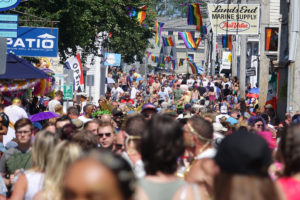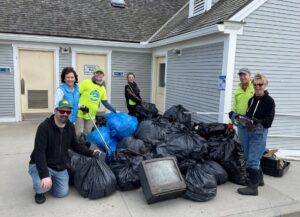If you’ve never visited Provincetown, you’re missing out on one of the most fun and eclectic experiences out there. Filled with color, comedy and culture, Provincetown is a culmination, as well as a celebration, of the Cape Cod experience. No trip here is complete without a visit to Commercial Street.
For those who are non-local, or have never had the opportunity to visit, here a few interesting facts about Provincetown you may not know:
Long Point, which is the thin peninsula jutting out at the tip of Provincetown and curling slightly back toward Truro, was a thriving fishing village during the early 1800s. In the 1850s, families decided to pack up and move back to the mainland portion of town (although historians have been unable to agree on the reason) – and they took their houses with them. The structures were floated on casks over a mile of water.
Provincetown became a Portuguese whaling and fishing community in the mid-18th century and evolved in the early 1900s into a distinguished art colony, which remains today. In fact, it is said that it’s actually the nation’s oldest art colony still in existence. The town is a beautiful three-mile stretch of galleries, interesting shops, delicious food and impressive old mansions.
Between April and October, the waters off of Cape Cod are perfect for spotting humpback whales. You can book for an early-morning sightseeing cruise with Whale Watch Dolphin Fleet, which has multiple departures from MacMillan Pier throughout the day.
Race Point Lighthouse is found in Provincetown. Built in 1816, it’s an historic lighthouse that was restored by the American Lighthouse Foundation and is listed on the U.S. National Register of Historic Places. It was one of the first lighthouses on Cape Cod to use a rotating beacon.
The 1920s and 1930s were when the presence of gays and lesbians outnumbered that of artists, writers, actors, and poets. These new arrivals found inspiration in the beauty of the town with its avant-garde freedom. They played a role in the development of the artistic colony here, and they participated in the development of modern American theater.
Provincetown boasts over 30 miles of beaches, which are part of the Cape Cod National Seashore. In 2016, Travel & Leisure magazine named it “America’s Best Beach Town.” The honor was bestowed not only for the town’s beautiful beaches, but also for its great restaurants, art culture and nightlife.
Summer time is an exciting time in the town. In case you’ve never experienced it, the world-famous Tea Dance at the Boatslip Beach Club is THE place to be from 4 to 7 p.m. in the summer (admission is $5). The popular daily LGBT (but very hetero-friendly) social event is a great place to sip cocktails, show off your dance moves, and make new friends. Even if you’re not up for dancing, the Tea Dance is always great for people-watching. (Check with the town for all upcoming events.)
Two other lighthouses can also be found in Provincetown, in addition to Race. Back in town, you can walk the harbor break wall from Pilgrim’s First Landing Park out to Long Point Beach, where you can spot both of them: Long Point Light and Wood End Light. Great photo ops abound, but give yourself enough time to walk back.
The Atlantic House (also known as the A-House) may possibly be the oldest gay nightclub in the U.S. It was built by Provincetown’s first Postmaster, Daniel Pease, in 1798, and was a hangout for some of America’s most well-known writers in the 1920s. The town became truly “gay-friendly” back in the early 1950s and has remained so to this day. It is one of the largest LGBTQ-friendly communities in the country.
























